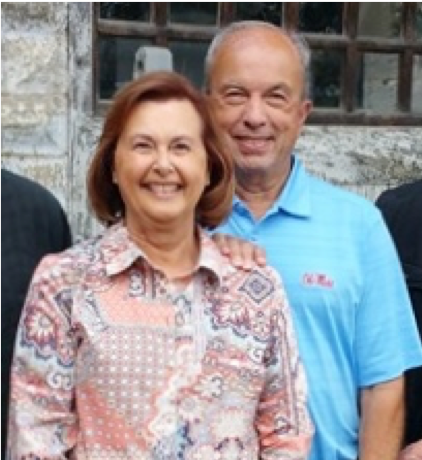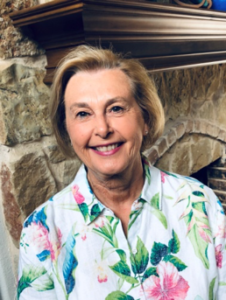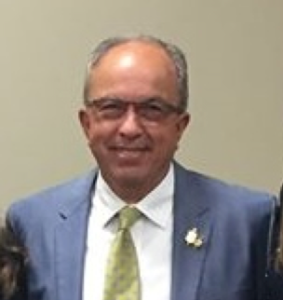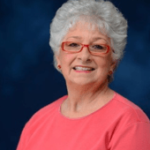Bonnie Brown
Bonnie Brown: Q&A with Becky and Marvin Wilson, Ole Miss Pharmacy Retirees
*Editor’s Note: The latest installment in the Ole Miss Retirees features is Becky and Marvin Wilson. The organization’s mission is to enable all of the university’s faculty and staff retirees to maintain and promote a close association with the university. It is the goal of the Ole Miss Faculty/Staff Retirees Association to maintain communication by providing opportunities to attend and participate in events and presentations.
My husband and I have had the pleasure of knowing Becky and Marvin through mutual affiliation with the Ole Miss School of Pharmacy. Their lives have always centered around their family. Becky and Marvin have both had successful careers. They each have an Ole Miss story to share.

Becky and Marvin Wilson.
Brown: Where did you grow up? Describe your home town and what was special about it.
 Becky Wilson: I grew up in Glen Dale, West Virginia. It’s a small town of about 2,000 in northern West Virginia, directly on the Ohio River. And when I say “small town” I mean small—only one traffic light! This community is located in the heart of coal and steel industries. It’s also the home of country music singer Brad Paisley and Arch Moore, Jr., former Governor of West Virginia. In fact, Brad Paisley’s dad, Doug, and I were in the same class and graduated from high school together.
Becky Wilson: I grew up in Glen Dale, West Virginia. It’s a small town of about 2,000 in northern West Virginia, directly on the Ohio River. And when I say “small town” I mean small—only one traffic light! This community is located in the heart of coal and steel industries. It’s also the home of country music singer Brad Paisley and Arch Moore, Jr., former Governor of West Virginia. In fact, Brad Paisley’s dad, Doug, and I were in the same class and graduated from high school together.
Marvin Wilson: I, too, grew up in Glen Dale which is approximately 75 miles south of Pittsburgh. Probably the neatest thing about the town for us kids was that one of the largest toy factories (MARX Toys of Big Wheel and Green Machine fame) in the U.S was located there. Yes, there was only a single traffic light. We had our own elementary school (grades 1-8), two grocery stores, a single church (Methodist) and two bars.
Brown: Please talk about your childhood, family, siblings, crazy aunts and uncles.
Becky Wilson: I was an only child. My dad was a World War II veteran. Mother was a housewife. Neither of them had a formal education past high school. Father worked in sales. He was wounded in the Battle of the Bulge which put restrictions on his day-to-day activities for the rest of his life. His brother was the only child of five who went to college and was a pharmacist. The family owned an independent pharmacy and he worked there. I grew up a Protestant but all religions were represented with my aunts and one uncle–Protestant, Catholic, Jewish and Mormon. This gave room for much dinner table “discussion.”
 Marvin Wilson: I too was an only child. My parents were married in their late 30’s and early 40’s and were much older than those of most of my peers. I only knew one of my grandparents and he lived with us during my late teens and early twenties during which time he had developed dementia. Both of my parents had completed a two-year business school curriculum following high school and both had worked in retail establishments for many years prior to their marriage. That was pretty exceptional for a female in those days. My father had been too young to fight in WWI and too old to fight in WWII. Mom’s family had a small farm and her father had been a carpenter; whereas, Dad’s family had owned a building supply company where I worked each summer from the time that I was 14 until I graduated from college. Among other duties, I unloaded boxcars of lumber, roofing, wallboard, etc. by hand, a piece at a time since forklifts had not yet been invented. Since it was a union shop, I had to join Jimmy Hoffa’s Teamster Union even though my family owned the business. This upset my dad. I can remember several strikes which got a little hostile with glass and nails being poured in our driveway. When I was younger my mother feared that I might even be kidnapped from our own yard.
Marvin Wilson: I too was an only child. My parents were married in their late 30’s and early 40’s and were much older than those of most of my peers. I only knew one of my grandparents and he lived with us during my late teens and early twenties during which time he had developed dementia. Both of my parents had completed a two-year business school curriculum following high school and both had worked in retail establishments for many years prior to their marriage. That was pretty exceptional for a female in those days. My father had been too young to fight in WWI and too old to fight in WWII. Mom’s family had a small farm and her father had been a carpenter; whereas, Dad’s family had owned a building supply company where I worked each summer from the time that I was 14 until I graduated from college. Among other duties, I unloaded boxcars of lumber, roofing, wallboard, etc. by hand, a piece at a time since forklifts had not yet been invented. Since it was a union shop, I had to join Jimmy Hoffa’s Teamster Union even though my family owned the business. This upset my dad. I can remember several strikes which got a little hostile with glass and nails being poured in our driveway. When I was younger my mother feared that I might even be kidnapped from our own yard.
Brown: Where did you go to school?
Becky Wilson: After graduating high school in a class of 60, I attended the Ohio Valley General Hospital School of nursing and received my RN. Although Marvin and I lived across the street from one another, we did not attend the same elementary or high schools even though we lived across the street from each other. My family moved into the neighborhood in the 8th grade. Our small town was located equidistance from two larger communities, each with a high school. We could choose to attend either school. As it turned out, we and our parents made different decisions. The schools were bitter rivals, so much so that we could not attend each other’s junior/senior proms even though we were dating at the time!
Marvin Wilson: I graduated from Moundsville High School which was two miles from Glen Dale in 1961 in a class of around 120. Fewer than 10 went on to college. I went to West Virginia University and graduated with a B.S. in Pharmacy degree in 1966. Whereas, folks now watch ping pong balls drop on TV to select winners of lotteries, in those days balls represented days of the year (birthdays) and the order in which they dropped determined the likelihood of being drafted into the military to fight in Vietnam. The week after I graduated, my wife and I married and moved to Ann Arbor, Michigan, to attend the graduate program in pharmacology at the University of Michigan Medical School. We knew no one in Ann Arbor and left all of our friends and family in West Virginia. I was not aware that at that time it was the number two rated department in the nation. All I knew was that they had a good football program and neat helmet design. I’m not sure how I got accepted to the program. There were seven in my doctoral class—all males. I really enjoyed my Ph.D. dissertation project which involved conditioning monkeys to give themselves intravenous injections of cocaine and trying to antagonize cocaine’s effects with other agents. Subsequent to my graduation in the summer of 1970, I completed a one-year post-doctoral residency in psychiatry at the University of Chicago.
Brown: Tell us how/when your Ole Miss “story” began? Who hired you? How long did you work at Ole Miss?
Becky Wilson: I came to Oxford in 1970 when my husband Marvin took a teaching position in the School of Pharmacy. Our son Dennis was 2 and our son Michael was born in January of 1971. I was hired by Dr. Gene Lee, Director of the Student Health Center, in 1990 and worked there for 19 and a half years until my retirement.
Marvin Wilson: My Ole Miss story began in the late summer and early fall of 1970. I was officially hired as an Assistant Professor of Pharmacology in the School of Pharmacy by Acting Dean Joe B. McCaskill and Dr. W. Marvin Davis, Chair of Pharmacology—which coincidentally happened the week after “Archie” broke his arm! I retired as Associate Dean for Academic and Student Affairs on June 30, 2014, but worked part-time for three more years. It was a heck of a 47-year ride!
Brown: What did you know about Ole Miss before you accepted a position here?
Marvin Wilson: The only things that I knew about Ole Miss when I visited in August of 1970 were: Ole Miss had a great football team, attractive coeds, was a socially conservative campus, and had survived the integration crisis. Further, the School of Pharmacy had a good reputation, new facilities, and a research emphasis that complemented my research interests. In reality we knew very little, but unlike my grad school peers I wanted to see if an academic career—rather than the pharmaceutical industry—was a better fit for me.
Brown: Working with students, I’m sure you each have had some memorable experiences. Describe your most memorable days at work.
Becky Wilson: Yes, I could say that many days were memorable. One was when I was taking care of a patient that had measles. This caused much concern and chaos on campus due to how easily it can spread. Students could not go to class if they had not had two immunizations. We worked 12-hour days to get everyone immunized and back to class. Every student’s medical record had to be checked. Once immunized and cleared, students were given a pass to get back into class. Parents were angry, especially those who were against immunizing their children. This was around 1993 and today we are once again dealing with a measles outbreak across the country.
Marvin Wilson: Given that my career spanned 47 years there were many memorable days at work, including 47 times when I joined in celebrating the accomplishments of my students, received letters acknowledging grant or contract funding, the birth of our second son, receiving letters indicating promotion and tenure decisions, and of my students receiving various recognitions. There were also some dark days including 9/11, the Chi Omega tragedy, Chucky Mullins funeral, and the days when notified of the deaths of current students.
Brown: What do you consider to be the highlight of your career?
Marvin Wilson: Being able to retire after almost 50 years!
Brown: Looking back on your life, what have you done that has given you the most satisfaction?
Marvin Wilson: Satisfaction was most important when my wife, sons, grandchildren, students, peers, or supervisors have indicated that an activity was well done or of value.
Brown: Your children grew up on the Ole Miss campus and I know you are proud of them. Tell us what they are doing these days.
Becky and Marvin: We have two sons, Dennis and Michael. Dennis was born in Ann Arbor, Michigan in 1968 and Michael was born at the old Oxford-Lafayette County Hospital in 1971. Both boys graduated from Oxford High School and Ole Miss. Dennis received both his B.S. in Pharmacy and law degrees from Ole Miss. He married Susan Commer from Gulfport. She too is a graduate of the Ole Miss School of Pharmacy. They have a son (Drew) and a daughter (Bennett). Drew is a rising junior majoring in accounting and finance at Ole Miss and Bennett will be joining him this fall as a freshman business major. Dennis works for CVS in Orlando in the specialty drug products section and Susan is a practicing hospital pharmacist.
Michael was an English and history major who later received his law degree from Southern Methodist University. He married Angela Turner, daughter of Dr. Gerald and Gail Turner, from Oxford and they have two sons, Luke (16) and Wyatt (12) and live in Colleyville, Texas. Luke plays the bass guitar and Wyatt plays the drums in a School of Rock band. Michael is a practicing attorney in Dallas and Angela, Associate Professor of Professional Practice in Voice, teaches voice at Texas Christian University.
Brown: What are the most common roadblocks that stop people from achieving their dreams?
Becky Wilson: I think fear of failure tops the list. Fear of failure causes us to unconsciously sabotage our chances for success. A fear of failure is essentially a fear of shame. Failing makes you worry about what other people think about you. And no one wants to feel bad about themselves.
Brown: What are some skills that you would like to learn?
Marvin Wilson: I would like to become more tech proficient. I also think that being able to give and accept constructive criticism is a useful skill set.
Brown: If there was something in your past you were able to go back and do differently, what would that be?
Becky Wilson: I would talk to my parents and extended family about their lives when they were young. And I would have listened more to their stories about their childhood. I wish I had learned to snow ski when I was young. I’m afraid if I tried it now, I would probably break something at my age.

Marvin, Becky, and Family — Ole Miss tailgating.
Brown: What are some of the biggest challenges you have faced?
Becky Wilson: It was very difficult having our elderly parents so far away. After getting ill and one in a nursing facility it was very hard.
Brown: What do you need to rant about or get off your chest?
Marvin Wilson: Helicopter parents, irresponsibility, supposedly educated people being so gullible, immaturity, fear of failure or of the unknown.
Brown: Do you think the present is better than 50 years ago? Why or why not?
Marvin Wilson: No, the present is just the present. Folks shouldn’t fear for the future; it will likely be better in some ways than the present and maybe worse in other ways. It will be the future. We should learn from the past, but we can’t go back. We need to be more committed about attempting to ensure that the future will be as good as possible and embrace it.
Brown: What single event has had the biggest impact on who you are?
Becky Wilson: That would have to be getting married and moving away from our parents just one week after we married! We just had each other. We came to depend on one another and built a solid marriage. Thankfully, we worked out any problems together.
Brown: What’s the best decision you’ve ever made?
Marvin Wilson: To marry my wife.
Brown: How comfortable are you with change?
Becky Wilson: I think I am very comfortable with change.
Brown: What’s the best part of your day?
Becky Wilson: Early morning when I don’t have to rush to get to work now that I’m retired.
Marvin Wilson: The best part of my day is just “waking up.”
Brown: What are you passionate about?
Becky Wilson: I’m most passionate about my family—my husband, Marvin, our sons Dennis and Michael, and their families.
Brown: What is the best advice you ever received?
Becky Wilson: Be yourself.
Marvin Wilson: Treat others like you would like to treated
Brown: What advice would you give to a young man or woman about to embark on a career in nursing?
Becky Wilson: I would tell them to be committed to your patients. Don’t do it just for a job or a source of income.
Brown: What movie or book character are you most similar to?
Becky Wilson: During the Christmas holiday our sons and their families were here. We were playing a game that asked that very question about me. Our grandchildren said Meryl Streep.
Brown: Tell us something about yourself that not many people may know.
Marvin Wilson: I won a woman-less beauty contest at the tender age of 67!
Brown: What’s your favorite way to waste time?
Becky Wilson: I love the spring and summer in the heat of the south. I love to sit outside in the sunshine and look at the backyard. My husband has created a real oasis and takes good care of it. It’s my happy place.
Brown: What’s your creative outlet?
Becky Wilson: I have made many needlepoint and cross-stitch items but my favorites are the Christmas stockings that I’ve made for everyone in our family. Some took as long as a year to finish while I was still working.
Marvin Wilson: Working in the yard. I also enjoy building Lego Star Wars models.
Brown: What do you do to improve your mood when you are in a bad mood?
Marvin Wilson: I listen to country music.
Brown: What has become your routine since you retired?
Becky Wilson: I don’t have a special routine. I started researching my ancestry and I enjoy that. I also love to read.
Marvin Wilson: My routine is not to be routine. Hobbies include working in the yard, building Lego models, collecting U.S. stamps, reading fiction, keeping up with grandchildren (three boys and a princess) and former students.
Brown: What is your legacy?
Becky Wilson: I would like to be remembered as a compassionate and caring nurse. I had a rewarding career. My practice included the University of Michigan Hospital, Communicare in Oxford, working for Dr. Thurston Wilkes (urologist in Oxford), and at Student Health Services at the University of Mississippi for almost 20 years. And while I’m proud of my profession and career, I would most like to be remembered as a loving wife, mother, and grandmother.
Marvin Wilson: I would hope that my legacy would be that I was accomplished in my field; that I treated folks fairly and with respect; that I was honest; that I cared that my students learned in order to better care for their patients; that I was always strived to improve; that I was detail-oriented; and most importantly, that I was a good husband, father and “Pops.”
 Bonnie Brown is a retired staff member of the University of Mississippi. She most recently served as Mentoring Coordinator for the Ole Miss Women’s Council for Philanthropy.
Bonnie Brown is a retired staff member of the University of Mississippi. She most recently served as Mentoring Coordinator for the Ole Miss Women’s Council for Philanthropy.
For questions or comments, email hottytoddynews@gmail.com.





























